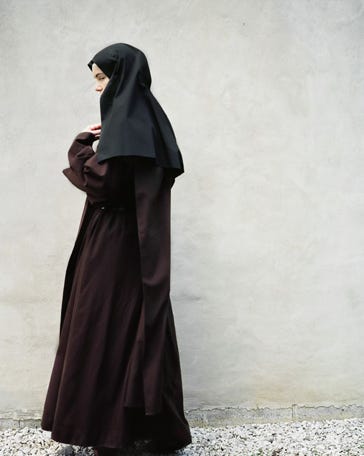
About the cover by Lyle Rexer:
Photographers are border crossers, immigrants to realms of experience not their own. But the camera is not a passport, and the transit can be harrowing. For years, Lili Almog, an Israeli-born New Yorker, had been fascinated by women who voluntarily surrender their lives to God and enter convents. In 2003, she had an opportunity to visit one of the most isolated cloisters of Carmelite nuns in Bethlehem, the birthplace of Jesus. The town had passed to Palestinian control, and to enter, Almog had to disguise her identity and cross the border on foot. Bethlehem, once a pilgrimage site, has relatively few Christians left, and the nuns more than ever have only the Lord as spiritual companion. In exhibitions of her photographs at the Andrea Meislin Gallery in Chelsea (May 13-June 30) and at The Photographers' Gallery in London (May 15-July 15), as well as in Perfect Intimacy, a new monograph from powerHouse Books, Almog captures the stillness, isolation, and rituals of these women. But Almog experienced emotions more complex than those of a voyeur just passing through. "Through stirring color and composition, Lili captures the celebration and even ecstasy of women who are in love with God," says Andrea Meislin. And, we might add, their dignity. Our cover image, Outdoor Portrait #14, has the stateliness of a fresco by Fra Angelico. Many of Almog's interiors have the lighting and precision of paintings by Vermeer. In her book's opening photograph, for instance, a nun pulls back a curtain to let in the light. As with Vermeer, the world enters, but only by suggestion. In Carmelite convents not only in Bethlehem but also in Haifa and in Port Tobacco, Maryland, Almog found the life she photographed powerfully attractive. "I experienced a constant vibrating energy in the air," she writes. "Perhaps it was because of the great compassion, fervent belief, creative activity and joy [the nuns] shared." Juxtaposed with still lifes and portraits of a world where time has stopped, where women grow old but the immediate world around them never changes, are photographs of celebration and freedom. In one photograph we see the aging hands of a woman who has passed her life in seclusion. But in another taken at the shore in Haifa, a blue-habited nun, leaping in the air, seems to embrace the bright expansiveness of sea and sky in a land that suggests for most of us only conflict and pain. Beyond the geographical borders Almog has crossed are those internal borders she encourages us to transcend, limits imposed by preconception, stereotype, and prejudice. This, of course, is the role of art, not to document but to unsettle, not to lecture but to seduce. And the artist who brings us into this world doesn't have to provide return passage. Her photographs transport us to this corner of Bethlehem, and in some sense, like the nuns, we never leave.




